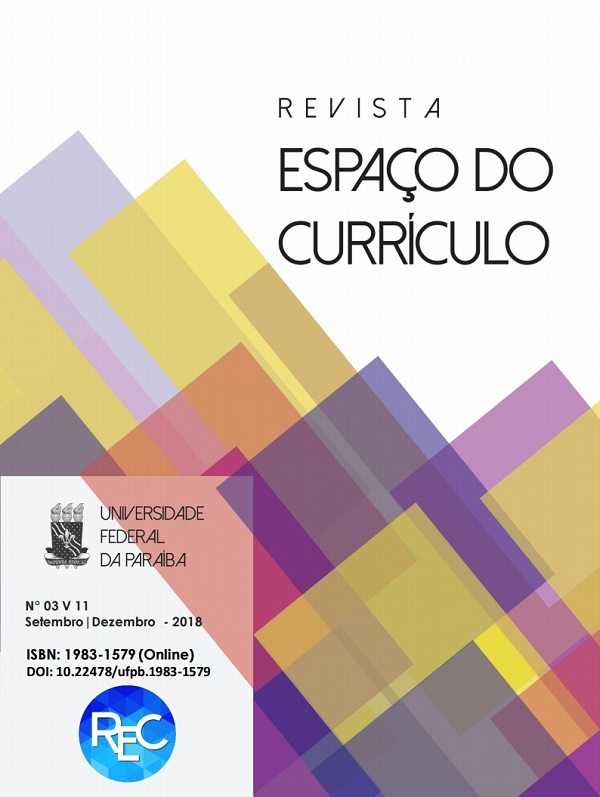AN EXPANDED BIOETHICS FOR THE INCLUSION OF REFLECTIONS ON ANIMAL AND ENVIRONMENTAL ISSUES
DOI:
https://doi.org/10.22478/ufpb.1983-1579.2018v3n11.40172Keywords:
Animals, Bioethics, Ecofeminism, Education, NatureAbstract
This article starts from the expansion of the meaning of the term Bioethics, seeking to justify in the discussion on ethics linked to life issues the inclusion of the problem of the moral status of non-human lives. It is about thinking about environmental problems as part of Bioethics, since the different lives are more or less integrated and constitute a continuum of interrelations and interdependencies. This sense of bioethics allows us to think about a critical environmental education in which the human individual does not perceive himself as outside and above the environment. The defense of this sense of Bioethics involves two interconnected theoretical strategies: 1) the need to deconstruct hierarchical dualisms of value so that the individual can think of himself as a subject inserted in a not only cultural environment, but also in some measure dependent on a natural world, against which your life is not opposed; 2) the importance of encouraging new ways of relating to other forms of life in a non-oppressive and destructive way in order to give full meaning to the idea of preserving nature. In this sense, it is intended to carry out, based on the contributions of ecofeminist thinking, a critique of the hierarchical dualisms of value that form the basis of the exploratory patriarchal worldview. The curricular component of Bioethics can be a space for raising awareness in Higher Education about the need to propose a new place for human beings in relation to other forms of life.
Downloads
Metrics
References
CUOMO, Chris. On Ecofeminist Philosophy. Ethics & The Environment, v. 7, n. 2, p. 1-12, 2002.
DALL’AGNOL, Darlei. Bioética: princípios morais e aplicações. Rio de Janeiro: DP&A, 2004.
___________, Darlei. Pressupostos metaéticos e normativos para uma nova Ética Ambiental. Revista Princípios, v. 14, n. 21, p. 67-82, jan./jun., 2007.
ENGELHARDT, JR., H. Tristam (Org.) Bioética global: o colapso do consenso. São Paulo: Paulinas, 2012.
GAARD, Greta. Ecofeminism and Wilderness. Environmental Ethics, v. 19, n. 1, p. 5-24, 1997.
GARRAFA, Volnei. Introdução à Bioética. Revista do Hospital Universitário / UFMA, v. 6, n. 2, p. 9-13, mai./ago., 2005.
HARLOW, Elisabeth M. The Human Face of Nature: Environmental Values and the Limits of Nonanthropocentrism. Environmental Ethics, v. 14, n. 1, p. 27-42, 1992.
HECK, José, N. Bioética: contexto histórico, desafios e responsabilidade. Revista Ethic@, Florianópolis, v. 4, n. 2, p.123-139, dez. 2005.
HOSS, Geni Maria. Fritz Jahr e o Imperativo Bioético: debate sobre o início da Bioética na Alemanha e sua importância em nível internacional. Revista Bioethikos, v. 7, n. 1, jan./mar. p. 84-86, 2013.
JAHR, Fritz. Ensaios em Bioética e Ética 1927-1947. Revista Bioethikos, v. 5, n. 3, p. 242-275, jul./set., 2011.
LOWER JR., Gerald M. Van Rensselaer Potter: A Memoriam. Cambridge Quarterly of Healthcare Ethics, v. 11, p. 329-330, out. 2002.
MATURANA, Humberto; VARELA, Francisco. A árvore do conhecimento: as bases biológicas da compreensão humana. São Paulo: Palas Athena, 2001.
MERCHANT, Carolyn. The Death of Nature. In: ZIMMERMANN, Michael et al (Orgs.). Environmental Philosophy. Upper Saddle River: Prentice Hall, 1998, p. 277-290.
MIES, Maria. A necessidade de uma nova visão: a perspectiva da subsistência. In: SHIVA, V.; MIES, M. Ecofeminismo. Lisboa: Instituto Piaget, 1993b, p. 387-420.
______, Maria. O dilema do homem branco: a procura do que deve ser destruído. In: SHIVA, V.; MIES, M. Ecofeminismo. Lisboa: Instituto Piaget, 1993a, p. 175-212.
MIES, Maria; SHIVA, Vandana. Introdução: porque escrevemos este livro juntas. In: SHIVA, V.; MIES, M. Ecofeminismo. Lisboa: Instituto Piaget, 1993, p. 9-34.
OLIVEIRA, Fábio A. G. Responsabilidade individual frente às mudanças climáticas globais. Rio de Janeiro: Multifoco, 2015.
PESSINI, Leo. Bioética das instituições pioneiras: perspectivas nascentes aos desafios da contemporaneidade - I. Revista Brasileira de Bioética, v. 1, n. 2, p. 145-163, 2005.
_______, Leo. Bioética das instituições pioneiras: perspectivas nascentes aos desafios da contemporaneidade– II. Revista Brasileira de Bioética, v. 1, n. 3, p. 297-311, 2005a.
PHILLIPS, Mary; RUMENS, Nick. Introducing Contemporary Ecofeminism. In: PHILLIPS, M.; RUMENS, N. Contemporary Perspectives on Ecofeminism. London: Routledge, 2016, p. 1-16.
PLUMWOOD, Val. Feminism and the Mastery of Nature. Londres: Routledge, 1993.
__________, Val. Nature, Self, and Gender: Feminism, Environmental Philosophy, and the Critic of Rationalism. In: ZIMMERMAN, Michael et al (Orgs.) Environmental Philosophy. New York: Prentice Hall, 1998, p. 291-314.
SHIVA, Vandana. Descolonizar o Norte. In: SHIVA, V.; MIES, M. Ecofeminismo. Lisboa: Instituto Piaget, 1993a, p. 345-359.
______, Vandana. O conhecimento indígena das mulheres e a conversão da biodiversidade. In: SHIVA, V.; MIES, M. Ecofeminismo. Lisboa: Instituto Piaget, 1993c, p. 215-227.
______, Vandana. Reducionismo e regeneração: uma crise na ciência. In: SHIVA, V.; MIES, M. Ecofeminismo. Lisboa: Instituto Piaget, 1993b, p. 37-52.
SINGER, Peter. Ética prática. 3. ed. São Paulo: Martins Fontes, 2002.
_______, Peter. Repensar la vida y la muerte: el derrumbe de nuestra ética tradicional. Barcelona: Paidós, 1997.
SINGER, Peter; MASON, Jim. A ética na alimentação. Rio de Janeiro: Campus, 2007.
TEIXEIRA, Michelle Cecille B. O ensino da Bioética. In: DIAS, Maria Clara (Org.). Bioética: fundamentos teóricos e aplicações. Curitiba: Appris, 2017, p. 243-261.
WARREN, Karen (Org.). Filosofías ecofeministas. Barcelona: Icaria, 1996.
_______, Karen. Ecofeminist Philosophy: A Western Perspective on What is and Why it Matters. Lanham: Rowman & Littlefield, 2000.
WHITEHOUSE, Peter J. Van Rensselaer Potter: An Intellectual Memoir. Cambridge Quarterly of Healthcare Ethics, v. 11, p. 331-334, out. 2002.
Downloads
Published
How to Cite
Issue
Section
License
By submitting an article to Curriculum Space Journal (CSJ) and having it approved, the authors agree to assign, without remuneration, the following rights to Curriculum Space Journal: first publication rights and permission for CSJ to redistribute this article. article and its metadata to the indexing and reference services that its editors deem appropriate.
















